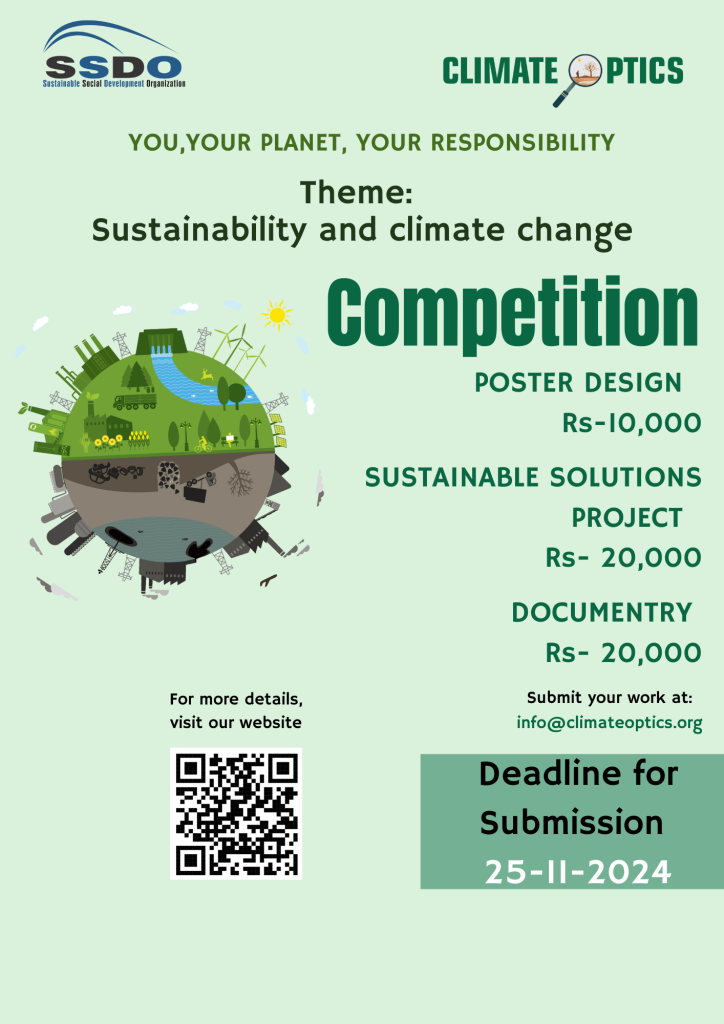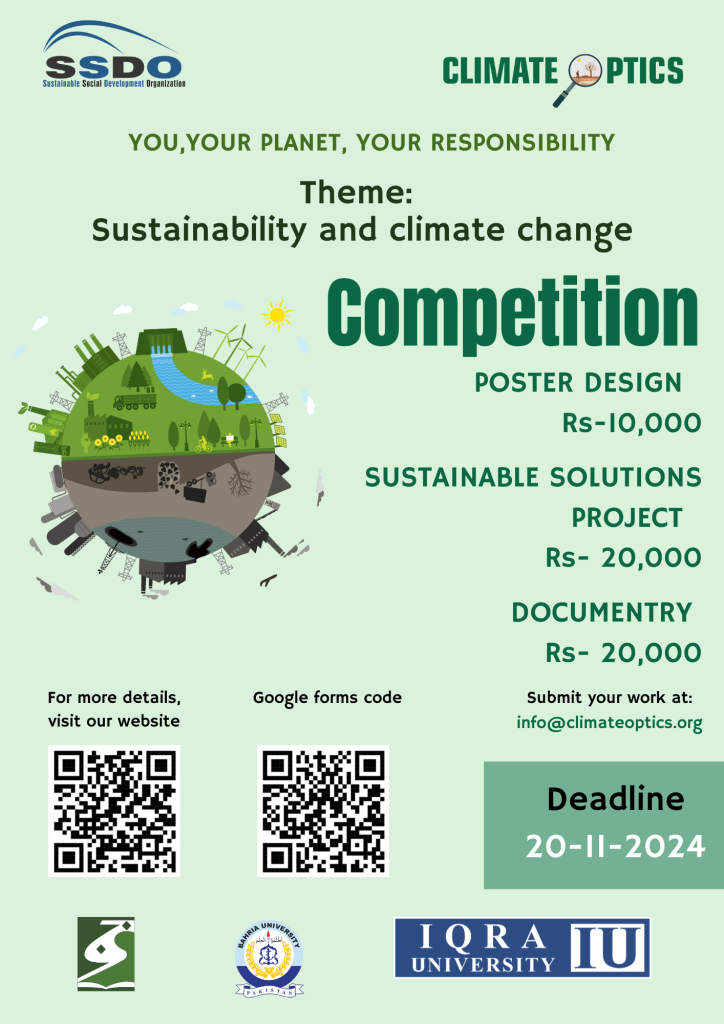How to Email Your Files Properly?
Use the Same Email for All Correspondence:
The email address used on the application form must be the same email used to send all official communication.
Use a Clear Subject Line:
Example: “Submission for Poster Competition”
Include Your Full Name:
Write your name clearly at the beginning of the email.
Mention Your Department:
State your department for identification.
Include Your University Name:
Specify which university you are attending.
Add Your Semester:
Mention your current semester (e.g., 2nd semester).
Attach Your Files:
Ensure your files are attached before sending.
Important Note: In case of any missing information (name, department, university, or semester), your submission will be disqualified.
Competition Announcement
1. Poster Making Competition
The Poster Making Competition aims to engage students in creatively showcasing their understanding of climate change and sustainability. Participants are encouraged to express their ideas through visual representations that highlight environmental issues and advocate for sustainable solutions. This competition provides a platform for students to communicate important messages on climate action through artistic expression.
TORs:
Open to all students enrolled in the department.
- Participants must work individually.
- The theme of the competition is “Sustainability and Climate Change.”
- Posters should creatively represent ideas, solutions, or messages related to sustainability and climate change.
- Posters must be designed digitally and printed on paper.
- All designs should be original and created by the participant.
- Plagiarism in any form will not be tolerated; all work must be the participant’s own.
- Each participant can submit one poster.
- Posters should be submitted in both digital format (via email) and printed format.
- Include the participant’s name, class, and contact information on the back of the printed poster.
- The poster should be emailed to info@climateoptics.org.
The posters will be prominently showcased on the competition day for evaluation and viewing by all attendees.
2. Sustainable Solutions Project
This competition challenges students to design and create innovative products using recyclable materials. The goal is to inspire practical, sustainable solutions that address environmental issues, while promoting the 3Rs—Reduce, Reuse, and Recycle. Participants will showcase their projects and explain the environmental impact of their creations.
TORs:
Open to all students enrolled in the department.
- Individual or group participation.
- Participants must create a product or project entirely from used recyclable materials.
- Projects should demonstrate innovative use, functionality, and adherence to sustainability principles.
- Freehand design is encouraged; participants can utilize various recyclable materials, including paper, plastic, glass, metal, and fabric.
- Participants must create a video documenting the entire process of creating their product.
- Record a video while working on the project to document your process.
- The video should be emailed. to info@climateoptics.org
- The video should include:
- Introduction to the idea and materials used.
- Step-by-step process of the creation.
- Final presentation of the product.
- The video must be clear, informative, and engaging, with a maximum duration of 3 minutes.
- File size must not exceed 20MB.
- Submit the final product and video by [insert submission deadline].
- All submissions should be sent to [insert submission email/online platform].
- Include a brief description (100-200 words) of the product, the inspiration behind it, and how it promotes sustainability.
The products will be showcased on the competition day, during which each student will present their work, explaining the process involved and the rationale behind their creation.
3. Documentary
As global temperatures rise, the impacts of climate change are becoming more visible, especially for those who work under the sun every day. “Silent Sufferers: Outdoor Workers and the Heat Crisis” is a documentary that brings attention to the often-unseen struggles of people working in outdoor environments—like road workers, university guards, construction laborers, and street vendors—who face the brunt of increasing heatwaves. Through their voices and expert insights, we explore how rising temperatures affect their health, livelihoods, and everyday lives. It’s a story of resilience, hardship, and the urgent need for climate action to protect those most at risk.
Documentary Steps and Structure:
- Personal Stories of Outdoor Workers
The documentary will feature interviews with individuals working in physically demanding, outdoor jobs. They will share personal stories about how rising temperatures are affecting their health, productivity, and overall well-being. - Health Risks Due to Heat Exposure
It will explore the medical risks these workers face, including heat exhaustion, dehydration, and other heat-related illnesses. Interviews with healthcare professionals can provide expert insights on the long-term effects of constant heat exposure. - Adapting to the Heat
Highlight the ways these workers try to cope with rising temperatures—like taking frequent breaks, staying hydrated, or working in shifts—and the limitations of these coping mechanisms in extreme conditions. - Impact on Daily Life and Productivity
Explore how extreme temperatures reduce workers’ efficiency and productivity, forcing them to take more breaks or limiting their working hours, which directly impacts their income. - Climate Change and Local Heat Trends
Incorporate data and expert commentary on how climate change has increased the frequency and intensity of heatwaves, making outdoor work more dangerous. Compare current temperature trends with those of previous decades to show the rapid rise in heat levels. - Potential Solutions
Showcase potential solutions or adaptations to help outdoor workers cope with extreme heat. This could include interviews with employers or policymakers on regulations like providing protective gear, installing shaded areas, or adjusting work hours to cooler parts of the day. - Call to Action
End with a powerful message emphasizing the importance of addressing climate change and taking immediate measures to protect outdoor workers from the increasing risks posed by rising temperatures.
TOR’s
Open to all students enrolled in the department.
- Individual or group participation.
- The theme of the competition is “Silent Sufferers: Outdoor Workers and the Heat Crisis”.
- A 4 to 5-minute video documentary.
- High-quality audio and video recording, edited and suitable for screening.
- A final cut that includes interviews, B-roll footage, and any additional information like data visualizations or voiceovers.
- The documentary should be emailed to info@climateoptics.org.



